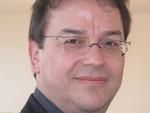Fakultätskolloquium am 31.01.2013 / Prof. Ulrich Hofmann, Peter-Osypka-Professor for Neuroelectronic Systems, Universität Freiburg
Direktzugriff
Artikelaktionen
Prof. Ulrich Hofmann
Sehr geehrte Damen und Herren, liebe Gäste,
Dekan Manoli und Prof. Wolfram Burgard möchten Sie ganz herzlich zum gemeinsamen Kolloquium der Technischen Fakultät und des Exzellenzclusters BrainLinks-BrainTools einladen:
Prof. Ulrich Hofmann, Peter Osypka Professor for Neuroelectronic Systems, University Clinic for Neurosurgery, Albert-Ludwigs-University, Freiburg
Title: Missing Link(s) - challenges in interdisciplinary research towards brain machine interfacing
Datum: Donnerstag, den 31. Januar 2013
Uhrzeit: 16.00 Uhr (c.t.)
Ort: Technische Fakultät, Georges-Köhler-Allee 101, 79110 Freiburg,
Gebäude 101, SR 01 09/13 (1. OG)
Abstract
Even though "interdisciplinary" is an often used buzz-word of nowadays research funding agencies, it means for the practicing researcher quite often to fall between many stools. On the other hand, complex endeavors, like the quest for brain machine interfacing, does demand true interdisciplinarity and as such needs links to connect specialist domains. The research done at my group for Neuroelectronic Systems sets out to act as this link in some areas of brain machine interfacing.
In his talk Prof. Hofmann will give an overview of what he deems to be important building blocks for brain machine interfaces as may be found useful in pre-clinical applications. The first and most important challenge tackled is the minimal invasive, yet long-term connection of recording and stimulating systems to the living brain. His current research shows long term implantation of flexible microprobes in rodent brains to present a promising path to chronic coupling. This may even be augmented by co-implanted adult stem cells for a better integration in brain tissue.
The second challenge is presented by the smart use of in vivo acquired signals from neurons and networks. For that purpose he tries to render the computing power of current smart phone processors for in situ signal analysis, which will then enable closed loop feedback to the very same brain regions recorded from. Closing this loop presents the third challenge with the highest possible reward, given the growing incidence of age and brain related diseases.
Integrating his developments in a biotop providing maximal usability is the final challenge and is tackled by means of miniature optical devices deployed by robotized systems.
Presenter
Ulrich Hofmann received his Diploma in Physics 1993 and his PhD in (Bio-)Physics from the TU Munich, München in 1996. Then he became an EU-fellow at the Finish Åbo Akademi University, Turku and joined 1997 the Biology Department of the California Institute of Technology (Caltech), Pasadena as Feodor-Lynen-Fellow for almost two years. In winter 1999 he became Senior Researcher at the Computer Science Department of the University of Lübeck with his own research group in Biosignal Processing and Neuroengineering. It was then when he coordinated the first European Silicon probe consortium. His teaching included digital signal processing, neuroprosthetics and computational neurosciences. In 2008 Dr. Hofmann was awarded the title Professor (apl.) and was operative in acquiring the Graduate School for Computing in Medicine and Life Sciences at the University of Lübeck. He is still a member of its Steering Committee.
Wir freuen uns auf Ihr Kommen.
Mit freundlichen Grüßen
Yiannos Manoli Wolfram Burgard
Dekan der Technischen Fakultät Sprecher Exzellenzcluster BrainLinks-BrainTools
Fußzeile
Benutzerspezifische Werkzeuge

